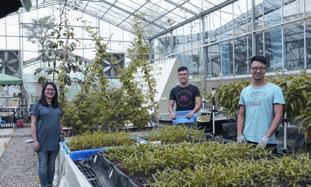Agrosystem of Harmonious Coexistence
2021-05-19ByZhouLin
By Zhou Lin
I nside the greenhouses of a modern agricultural base in Jiangmen, Guangdong Province, grow hydroponic vegetables, ranging from ordinary ones to varieties rarely seen on the market. Trickles of water circulate within the hydroponic structure. Inside the pools seven species of fish are raised, living in harmony with the hydroponic vegetables.
“Fish farming without the need to change the water and growing vegetables without the need to fertilize. This is the fish-vegetable symbiosis system we have developed, essentially a model of circular agriculture,” said Fung Leung, a young man from Hong Kong and co-founder of the project. “All the vegetables are free of pesticide residues, because once pesticides and fertilizers are applied, the fish will die.”
Founders of this eco-friendly hi-tech agricultural project are three young people from Hong Kong, all born in the 1990s. Classmates in high school, they graduated from different universities in Hong Kong. In their senior year in university, they came up with the idea of building their own fishvegetable symbiosis system.
“In 2014, we set up a rooftop farm for the design and implementation of this organic farming system. But as the scale of the farm expanded, our limited space in Hong Kong was not enough for our experiments,” said Leung. In 2016, the trio began looking for agricultural parks on the mainland. After visiting several other cities without success, they came to the comprehensive demonstration base of modern agriculture in Jiangmen. The citys agriculture bureau offered a great deal of assistance to support the startup.
Since starting their business in Jiangmen, Leung has also witnessed the development that has taken place in the city and also in the Greater Bay Area, an area covering Guangdong Province and Hong Kong and Macao special administrative regions.

“Better transportation and more frequent exchanges between the mainland and Hong Kong and Macao have also helped us reduce transport costs,” he said.
According to Leung, the three entrepreneurs expanded their project in 2019, establishing 8,000-square-meter smart greenhouses that can produce a total of 400 tons of vegetables per year. They then established a second project in Jiangmen, which covers an area of 26.67 hectares and is capable of producing 8,800 tons of vegetables per annum for Hong Kong, as well as Zhuhai and Zhongshan, two other cities within the Greater Bay Area.
“Food safety is what people are most concerned about in their pursuit of quality life. Local agriculture in Hong Kong is unable to satisfy the citys demand for such products in terms of scale and quality. Vegetables supplied to Hong Kong from the mainland must meet very high standards throughout the whole process of production and processing,” said Mandy Tam, co-founder of the project. According to Tam, it is promising business opportunities such as these that have convinced the trio to focus on growing organic vegetables in the mainland in the long term.
Leung said the opportunities for coordinated development in the Greater Bay Area, as well as the institutional building that encourages innovation and business startup, fill them with high hopes for the future. BR
